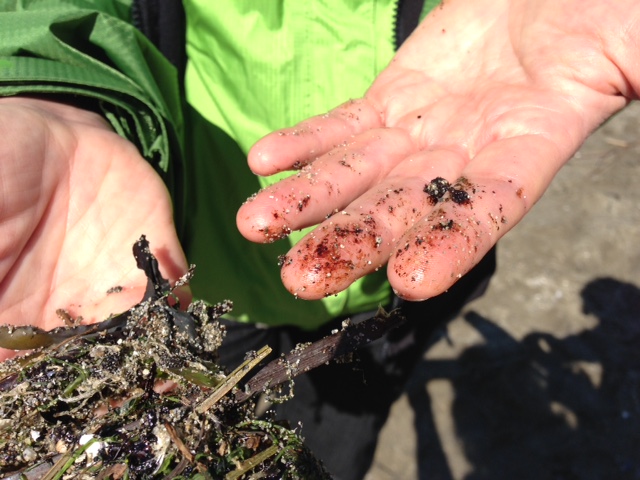Vancouver Coastal Health says there is no risk to the general public from the oily substance washing up on some Vancouver beaches after a spill in English Bay Thursday.

Anna Marie D’Angelo with Vancouver Coastal Health told Global News only people who come in direct contact with the oil may see adverse effects.
Some residents and protesters were seen trying to clean the beaches in the aftermath of the spill.
D’Angelo says touching the toxic substance may cause dermatitis, nausea and headache.
“If you start inhaling the fumes, that’s going to cause problems too,” she says. “There are all kinds of things that can happen, so it’s best to just avoid it.”
People who come in contact with the oil are asked to wash their hands with clean water and soap.
“You might have to discard your shoes and clothing that’s been in contact with the oil as well,” says D’Angelo.
Meanwhile, city staff and park board rangers continue to patrol affected Vancouver beaches warning people and their dogs to stay away from the water.
Dr. Martin Haulena, head veterinarian with Vancouver Aquarium Marine Science Centre, says they are deploying a team of specially trained members of the Oiled Wildlife Society of BC to observe the shorelines along English Bay today.
Haulena says seabirds have been reported with oil and are in need of assistance. He says there may be other marine life that is impacted.
On Thursday, Vancouver Park Board’s wildlife technicians observed four water birds with oiled feathers on the foreshore near Second Beach. The birds went back into the water before they could be assessed.
The oil can inhibit the birds’ ability to stay warm and excessive preening can lead them to ingest toxic oil, which can result in severe internal problems.
WATCH: Global BC‘s Linda Aylesworth reports on the effect of the spill on marine life and animals
Dr. Peter S. Ross, a marine pollution expert with the Vancouver Aquarium, was collecting samples of the oily substance Thursday afternoon.
Ross is concerned the oil is starting to cover barnacles and other invertebrates, which are part of the food chain consumed by other wildlife.
The Vancouver Aquarium Rescue Centre says it is prepared to admit impacted marine mammals and provide pre-release housing for post-washed seabirds.
The aquarium says their Rescue Centre team is trained in oil response and members of the public should not be handling marine life.
If members of the public come across oiled marine life, they should call the Rescue Centre team at 604 258 SEAL.




Comments